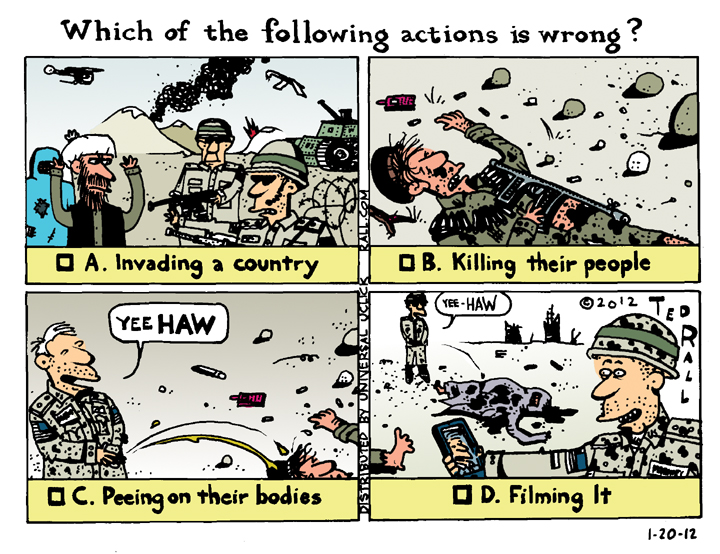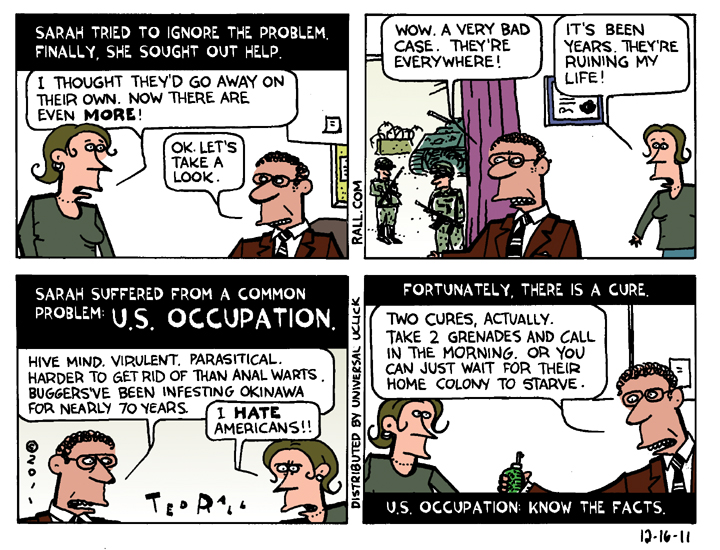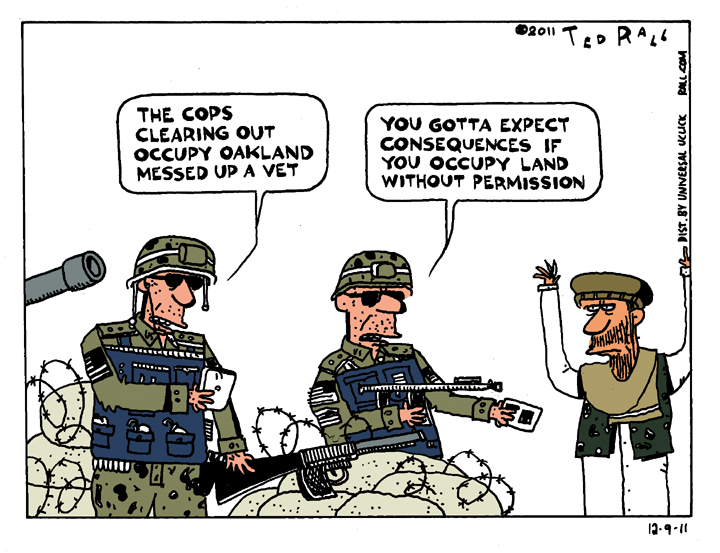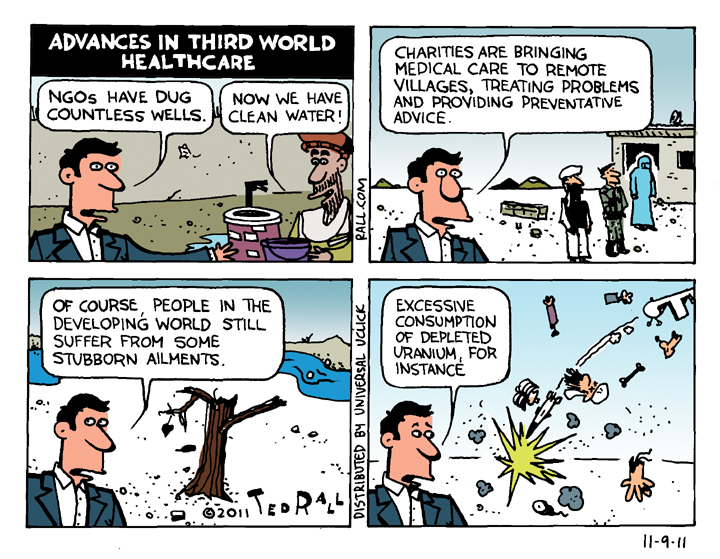The US State Department announces that it has a fleet of drone planes. What next?
SYNDICATED COLUMN: The Corpse-Urinating Kids Are Alright
More Jobs for Our Valiant Marine Heroes
“Eighteen, 19-year-old kids make stupid mistakes all too often and that’s what occurred here.”
This was the nuanced reaction of Rick Perry, governor of the supposedly important state of Texas, who has signed dozens of death warrants (at least one for an innocent man), who thinks he deserves to be president, to a video of Marines in U.S.-occupied Afghanistan peeing on dead Afghan resistance fighters.
“Golden, like a shower,” says one.
Nice.
Amazing to watch how ten years and the catastrophic American military defeats in Iraq and Afghanistan have changed our views about the shock troops of American militarism. After 9/11 our sainted soldiers could do no wrong. They were inherently noble. They were heroes. Even liberals said so.
Uneducated and ignorant, yes, but these brave young men and women deserved our gratitude for defending our freedoms against the Islamofascist hordes lest a land bridge somehow appear between the Old and New Worlds. Who cared 85 percent of U.S. troops in Iraq told a 2006 Zogby poll that their mission was “to retaliate for Saddam’s role in the 9/11 attacks”?
They had big hearts. And small brains. The rapists of Abu Ghraib and Guantánamo, the murderers of Bagram, the rapist-murderers of Haditha? Just a few bad apples.
No longer. Defeat has followed defeat. Each “successful” drone strike against “enemy militants” in Afghanistan and Pakistan gets followed by a sheepish “well, yeah, they were all innocent women and children” press release. War grates on the nerves; losing wars are worse. Why, broke and jobless Americans, are we still spending $1 million a year per soldier to chase down one Al Qaeda #2 after another?
America’s glorious crusade is over. We know the U.S. mission in Afghanistan is to subjugate, terrorize and brutalize the local population. Even state-controlled media admits it.
“There is no question that the Taliban are brutal, including against their own people,” opines The New York Times editorial board. “The 1,000-man battalion lost seven men during its seven months in Helmand. But the stress of combat cannot excuse desecrating corpses—not to mention filming it.”
Love that last emphasis.
How many zillions of times have similar or worse outrages been carried out by soldiers smart enough to keep their camera cellphones in their pockets?
Not to mention the disproportionality. It sucks to lose seven people. Especially if you’re one of them. How many Afghans did that unit kill during those same seven months? They killed four—the ones they peed on—in a single day. As for Taliban brutality—well, they are Afghans. What are we doing over in their country?
Memo to U.S. forces: OK to invade foreign nation that posed no threat. OK to occupy said country for years. OK to impose a corrupt puppet government. OK to kill the locals. Probably OK to piss on them. Just don’t film it.
Of all the many stupid things Rick Perry has said during his political career his defense of the piss-and-vinegar marines rank among one of the smartest. Perry is right: they are dumb kids.
Which prompts a Big Question. We don’t trust kids to drink. Hell, you can’t even rent a car until you’re 25. So why do we outfit a bunch of dumb 18- and 19-year-old kids prone to making “stupid mistakes all too often” with high-powered automatic weapons, then unleash them with a license to kill hapless foreigners?
Thanks to Rick Perry, the answer is clear:
Plausible excusability.
War crimes is just what dumb kids does. No one’s fault. Just is.
This blame-the-brats approach has a lot of potential for America’s hapless ruling class. Like, get rid of the weird cabals of angry old country-club neo-cons. The next time we want to gin up a quagmire from thin air, let’s assign the job of choosing the target and marketing the war to a bunch of dumb 18- and 19-year-olds from West Virginia. Whatever goes wrong won’t be anyone’s actual fault.
Plausible excusability—they’re just dumb kids!—works for domestic policy too.
Whenever the government is in the mood to shovel hundreds of billions of taxpayer dollars into the coffers of giant banks while ignoring the plight of the un- and underemployed, keep the gray old men of the Fed out of it. Roll a few kegs over to the nearest frat and let the freshman and sophomore econ majors have at it. So the global economy tanks. Who cares? Just a buncha stupid kids doing stupid kid stuff.
What’s that?
Don’t blame me if this column is stupid. I took the week off.
Stupid kids.
(Ted Rall is the author of “The Anti-American Manifesto.” His website is tedrall.com.)
COPYRIGHT 2012 TED RALL
SYNDICATED COLUMN: Obama’s “Mission Accomplished”
Wars and Prisons Move, Wars and Torture Never Ends
Most Americans—68 percent—oppose the war against Iraq, according to a November 2011 CNN poll. So it’s smart politics for President Obama to take credit for withdrawing U.S. troops.
As it often is, the Associated Press’ coverage was slyly subversive: “This, in essence, is Obama’s mission accomplished: Getting out of Iraq as promised under solid enough circumstances and making sure to remind voters that he did what he said.”
Obama’s 2008 campaign began by speaking out against the war in Iraq. (Aggression in Afghanistan, on the other hand, was not only desirable but ought to be expanded.) However, actions never matched his words. On vote after vote in the U.S. Senate Obama supported the war. Every time.
As president, Obama has claimed credit for a December 2011 withdrawal deadline negotiated by his predecessor George W. Bush—a timeline he wanted to protract. If the Iraqi government hadn’t refused to extend immunity from prosecution to U.S. forces, this month’s withdrawal would not have happened.
“Today I can report that, as promised, the rest of our troops in Iraq will come home by the end of the year. After nearly nine years, America’s war in Iraq will be over,” Obama bragged reporters on October 24th.
The UK Guardian noted: “But he had already announced this earlier this year, and the real significance today was in the failure of Obama, in spite of the cost to the U.S. in dollars and deaths, to persuade the Iraqi prime minister Nouri al-Maliki to allow one or more American bases to be kept in the country.”
Obama’s talk-no-walk approach to foreign policy is also on display on Guantánamo, the torture camp set up by the Bush Administration where thousands of Afghans and other Muslim men, including children, were imprisoned and tormented without evidence of wrongdoing. Only 171 prisoners remain there today, held under appalling conditions.
Yet the “war on terror” mentality remains in full force.
Obama ordered the construction and expansion of a new concentration camp at Bagram airbase in Afghanistan to house thousands of new and current inmates in the U.S. torture system. Now The New York Times has discovered that the Obama Administration has developed “the other Guantánamo, an archipelago of federal prisons that stretches across the country, hidden away on back roads” inside the United States. Hundreds of Muslim men have been imprisoned by means of the thinnest veneer of legality.
“An aggressive prosecution strategy, aimed at prevention as much as punishment, has sent away scores of people. They serve long sentences, often in restrictive, Muslim-majority units, under intensive monitoring by prison officers. Their world is spare,” announced the paper.
Aware that “his” war against Afghanistan isn’t much more popular among voters than the occupation of Iraq, Obama set a 2014 for withdrawal from the Central Asian state several years ago.
Dexter Filkins called it “the forever war”: a post-9/11 syndrome that drives the United States to shoot and bomb the citizens of Muslim nations without end. You can’t end a forever war. What if you had to sit down and get serious about taking care of the problems faced by regular, boring, American people?
And so Obama is having his ambassador to Afghanistan, Ryan Crocker, release trial balloons about staying past 2014…forever, in so many words.
Talking to reporters, Crocker said that the U.S. would stay longer if the Karzai regime—its handpicked puppet—asked them to. “They [the Afghans] would have to ask for it,” he said. “I could certainly see us saying, ‘Yeah, makes sense.'”
Vampires can’t come inside unless they’re invited.
The Iraq War, at least, seems to be coming to an end. According to the Pentagon, there will only be 150 U.S. troops in Iraq next year—those who guard the embassy in Baghdad.
Sort of.
Just shy of 10,000 “contractors”—the heavily-armed mercenaries who became known for randomly shooting civilians from attack helicopters—will remain in Iraq as “support personnel” for the State Department.
As they say, war is an addiction. If we wanted to, we could quit any time.
Any time. Really.
(Ted Rall is the author of “The Anti-American Manifesto.” His website is tedrall.com.)
COPYRIGHT 2011 TED RALL
AL JAZEERA COLUMN: U.S. Double Standard: Gaddafi Bad, Karimov Good
The US shows its hypocrisy by accusing “tyrants” of human rights abuses while not owning up to supporting dictators.
“After four decades of brutal dictatorship and eight months of deadly conflict, the Libyan people can now celebrate their freedom and the beginning of a new era of promise,” President Obama said last week. The capture and death of Moammar Gaddafi prompted him and other U.S. officials to congratulate the Libyan people on their liberation from a despot accused of terrible violations of human rights, including the 1996 massacre of more than 1200 prison inmates.
The kudos were as much for the U.S. itself as Libya’s victorious Transitional National Council. After all, the United States played a decisive role in Gaddafi’s death. First President Obama put together the NATO coalition that served as the Benghazi-based rebels’ loaner air force. When the bombing campaign was announced in February, Gaddafi’s suppression of the human rights of protesting rebels was front and center: “The United States also strongly supports the universal rights of the Libyan people,” Obama said at that time. “That includes the rights of peaceful assembly, free speech, and the ability of the Libyan people to determine their own destiny. These are human rights. They are not negotiable. They must be respected in every country. And they cannot be denied through violence or suppression.” (No word on how police firing rubber bullets at unarmed, peaceful protesters at the Occupy movement in Oakland, California fits into that.)
And in the end, it was a Hellfire missile fired by a Predator drone plane controlled by the American CIA—in conjunction with an attack by a French fighter jet—that destroyed the convoy of cars Gaddafi and his entourage used to try to escape the siege of Sirte, driving him into the famous drainage pipe and into the hands of his tormentors and executioners.
American officials and media reports were right about Gaddafi’s human rights record: It was atrocious. They cautioned the incoming TNC to make human rights a priority: “The Libyan authorities should also continue living up to their commitments to respect human rights, begin a national reconciliation process, secure weapons and dangerous materials, and bring together armed groups under a unified civilian leadership,” Obama said. (No word on how Gaddafi’s execution fits in to that.)
Yet the very same week the United States was cozying up to another long-time dictator—one whose style, brutal treatment of prisoners, and notorious massacre of political dissidents is highly reminiscent of the deposed Libyan tyrant.
Like a business that maintains two sets of records, one for the tax inspector and the other containing the truth, the United States has two different foreign policies. Its constitution, laws and treaty obligations prohibit torture, assassinations, and holding prisoners without trial. In reality there are secret prisons like Guantánamo. Similarly, there are two sets of ethical standards in America’s dealing with other countries. Enemies are held to the strictest standards. Allies get a pass. This double standard is the number-one cause of anti-Americanism in the world.
In yet another display that exposes American foreign policy on human rights as hypocritical and self-serving, U.S. Secretary of State Hillary Clinton traveled to Uzbekistan to establish closer ties to the Central Asian republic’s president for life, Islam Karimov. Even as her State Department was ballyhooing the bloody conclusion of Gaddafi’s 42-year reign as a victory for freedom and decency, the former First Lady was engaged in the cynical Cold War-style of one of the worst human rights abusers in the world.
SYNDICATED COLUMN: Stop Demanding Demands
Connecting the Revolutionary Dots in Occupied Washington
“Our demand is that you stop demanding that we come up with demands!”
I thought about that line a lot this past week. (It’s from a recent cartoon by Matt Bors.) I was at Freedom Plaza in Washington, a block from the White House, at the protest that began the whole Occupy movement that has swept the nation: the October 2011 Stop the Machine demonstration.
It has been one of the most exciting weeks of my life.
Stop the Machine, timed to begin on the October 6th anniversary of the U.S. invasion of Afghanistan ten years ago, was based on a simple, powerful premise. A coalition of seasoned protesters including Veterans for Peace, CodePink, Fellowship of Reconciliation, Progressive Democrats of America and Peace Action would take over a public space, then refuse to leave until our demand–withdrawal from Afghanistan–was met.
Adbusters magazine preempted our demonstration, which had been widely publicized, with Occupy Wall Street.
It’s the sort of thing an unscrupulous businessman might do.
But it’s all good. The sooner the revolution, the better. And the Occupy folks did choose a better name.
Like other old-timers (I’m 48), I criticized Occupy Wall Street for its wanky PR and street theater shenanigans. Yoga, pillow fights and face painting for the masses, but do the masses give a damn? Critiquing with love, I joined others in the media for demanding specific demands. That, after all, is how agitators used to do things. Hijack a plane and ask for money. Take over a prison until the warden agrees to improved conditions. Strike until you get a raise.
That’s one of the things that changed on 9/11. No one ever claimed responsibility for the attacks. No group issued any demands.
The Stop the Machiners in Freedom Plaza are mostly Gen Xers in their 40s and Baby Boomers in their 50s and 60s-. There are hundreds, sometimes thousands, of them, many spending the night in tents. Eight blocks away in McPherson Square is Occupy DC, the decidedly younger and whiter (mostly Gen Yers in their 20s) Washington spin-off of Occupy Wall Street. As you’d expect, Occupy is wilder and more energetic. As you’d also expect, Stop the Machine is calmer and more organized.
Stop the Machine has Portapotties.
It even has a station where you can wash your hands after you use the Portapotties.
“What are your demands?” my friends back home emailed me. Trust me: No one is more aware of the need to issue demands than the protesters of the Occupy and Stop the Machine movements (who obviously ought to merge).
Coming up with demands is job one. But job one is slow going. This is not merely a non-hierarchical but an anti-hierarchical movement. Everyone gets an equal say. Influenced by the Occupy movement (and other progressive protests, such as the anti-globalization struggle), Stop the Machine has embraced a system in which all decisions are arrived at by unanimous consensus. Anyone, regardless of their social status or education, can block a decision agreed upon by hundreds of other people.
Before last week I thought this decision-making process was madness. No leaders means inefficiency, right? Well, right. Meetings drag on for hours. Often nothing, or very little, gets done. Discussions go off on tangents. Poorly informed and even mentally disabled people get to talk. And everyone–even those of us with years of political experience and education–have to sit there and listen.
It sucks. And it’s great. It’s great because it gets out from behind our keyboards and out into the streets and in direct contact with our fellow human beings.
I’m as snotty as they come. Out on the Plaza, however, snark is a liability. A scary homeless guy heckled me while I gave a speech calling for revolution over reform of the system; he went on so long and so intensely that a D.C. cop tried to take him away. I couldn’t just click away. I was forced to engage with him. To discuss. To agree to disagree.
Revolution is a messy, slow process. We are just beginning to claw away at the velvet ropes of alienation that simultaneously comfort and confine us. We’re beginning to see that the things we hold so dear–our place in the class structure, our educational credentials, our shrinking but oh-so-clever circles of friends–are means of oppression.
There were 15 committees formed to come up with demands about various topics, which would eventually be presented to the General Assembly for discussion and, with luck, approval by consensus.
I joined the Economics and Finance committee.
“I don’t understand the word ‘neoliberal’,” a woman who looked to be about 30 said.
“It means conservative,” a guy answered.
No it doesn’t.
I shut up. In consensus meetings, you quickly learn to choose your battles. Those battles can run late into the night.
I urged our committee to decide whether we were revolutionaries or reformists.
“Why does it matter?” asked our “facilitator” (the leader-who-is-not-a-leader).
We went on to waste the next several months debating the distinctions between revolutionaries who seek to overthrow the system, reformists who accept its basic structure but seek to improve upon it, and revolutionists-posing-as-reformers who issue what I call “unreasonable reasonable” demands–demands that are popular with the population but that the system can’t concede without undermining the essential nature of their relationship to the people, the idea being to expose the government as the uncaring, unresponsive monsters, thus radicalizing the moderates and fence-sitters.
OK, it was about an hour. It only seemed like months.
We only came up with two demands for the general assembly to consider. But that doesn’t matter.
The process of discussion educates everyone involved in it. Obviously, the better informed share information with the less informed. But the knowledge flow goes both ways. The better informed learn what is not known, what must be transmitted to the public at large. And of course the less informed about one topic are usually better informed about another.
Demands will surface. But there’s no rush. Let the intellectual cross-fertilization run its course.
Besides, it’s fun to watch the ruling-class-owned media squirm as they wait.
(Ted Rall is the author of “The Anti-American Manifesto.” His website is tedrall.com.)
COPYRIGHT 2011 TED RALL
AL JAZEERA COLUMN: The De-politicization of Political Media
US political ideologies are converging on the right, but the power of ideas doesn’t matter in this popularity contest.
“President Obama’s support is eroding among elements of his base,” began a front-page story in the September 16th New York Times. Experienced readers understood what was meant. The U.S. Democratic Party “base” is comprised of liberals, progressives (to the left of liberals), and self-identified leftists (composed of socialists, communists and left libertarians).
These and other groups that compose the Democratic coalition—feminists, gays and lesbians, labor unions, etc.—pursue separate agendas. For decades American media consumers received granular, detailed analyses of each segment, their goals, accomplishments and failures to influence the party and the nation. No longer. These factions are increasingly being excluded and omitted from coverage in favor of something new: a formless, mushy whatever.
Call it “the base.”
Conventional wisdom—in other words, talking points repeated by columnists for big-city newspapers and cable-television news commentators—holds that the American electorate is roughly divided as follows: 40 percent who consistently vote Democratic, and another 40 percent who always vote Republican. These 80 percent of party loyalists are their base: if they vote at all, they always vote for the same party.
The outcome of elections depends on the whims of the remaining 20 percent, “swing voters” who may vote Democratic one election, Republican the next.
With a few exceptions, strategists and candidates for the two major parties direct most of their appeals to this “vital center” of the ideological spectrum. “Where else are they going to go?” is the constant, cynical refrain of political operatives when asked about the bases of the parties. If you’re a liberal voter, in other words, you probably won’t vote Republican. If you’re a conservative voter, you won’t jump to the Democrats no matter how disappointed you are with “your” party. (Historically, however, the Republican Party tends to coddle its right-wing base—with rhetoric as well as policy shifts—more than the Democrats pay attention to the left.)
The quest for swing voters relies on simple math. Convince a “swing voter” to switch from their party to yours and you’re up two votes. Lose a “base” voter and you’re down one. Swing voters count double.





